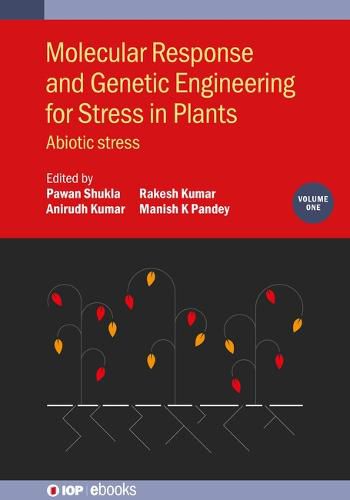Readings Newsletter
Become a Readings Member to make your shopping experience even easier.
Sign in or sign up for free!
You’re not far away from qualifying for FREE standard shipping within Australia
You’ve qualified for FREE standard shipping within Australia
The cart is loading…






This title is printed to order. This book may have been self-published. If so, we cannot guarantee the quality of the content. In the main most books will have gone through the editing process however some may not. We therefore suggest that you be aware of this before ordering this book. If in doubt check either the author or publisher’s details as we are unable to accept any returns unless they are faulty. Please contact us if you have any questions.
Molecular Response and Genetic Engineering for Abiotic Stress in Plants (Vol.1) , comprehensively and coherently reviews the different abiotic (non-living) stress response
mechanisms in plants with respect to the various aspects of rapidly growing omics
techniques like genomics, transcriptomics, proteomics, metabolomics and strategies
through genetic engineering and molecular breeding for crop improvement. This book provides detailed examination of how genes and metabolites are modulated in plants in
response to various diseases. This edited title provides case studies of several crop plants
concerning genetic engineering strategies which have been used for enhancing
productivity and resilience. This first volume covers the various abiotic stress response
mechanisms in plants within the view of climate change and global food security.
Key Features:
Book explains the different molecular mechanisms and genetic engineering strategies
which have been developed and adopted to cope with consistent environmental
changes and global climate change.
It explores the latest developments concerning abiotic and biotic stress response at
the molecular level for the improvement of crop quality and sustainable agriculture.
It presents an exploration of the challenges and conceivable solutions to improve
yields of the staple of food crops using data on agricultural sciences and omics
technology.
It discovers how the better understanding of molecular mechanisms of plant response to different stress would be used to improve the quantitative and qualitative features
of crop plants and allied areas.
There will be an inclusion of end-of-chapter problems and case studies.
$9.00 standard shipping within Australia
FREE standard shipping within Australia for orders over $100.00
Express & International shipping calculated at checkout
This title is printed to order. This book may have been self-published. If so, we cannot guarantee the quality of the content. In the main most books will have gone through the editing process however some may not. We therefore suggest that you be aware of this before ordering this book. If in doubt check either the author or publisher’s details as we are unable to accept any returns unless they are faulty. Please contact us if you have any questions.
Molecular Response and Genetic Engineering for Abiotic Stress in Plants (Vol.1) , comprehensively and coherently reviews the different abiotic (non-living) stress response
mechanisms in plants with respect to the various aspects of rapidly growing omics
techniques like genomics, transcriptomics, proteomics, metabolomics and strategies
through genetic engineering and molecular breeding for crop improvement. This book provides detailed examination of how genes and metabolites are modulated in plants in
response to various diseases. This edited title provides case studies of several crop plants
concerning genetic engineering strategies which have been used for enhancing
productivity and resilience. This first volume covers the various abiotic stress response
mechanisms in plants within the view of climate change and global food security.
Key Features:
Book explains the different molecular mechanisms and genetic engineering strategies
which have been developed and adopted to cope with consistent environmental
changes and global climate change.
It explores the latest developments concerning abiotic and biotic stress response at
the molecular level for the improvement of crop quality and sustainable agriculture.
It presents an exploration of the challenges and conceivable solutions to improve
yields of the staple of food crops using data on agricultural sciences and omics
technology.
It discovers how the better understanding of molecular mechanisms of plant response to different stress would be used to improve the quantitative and qualitative features
of crop plants and allied areas.
There will be an inclusion of end-of-chapter problems and case studies.